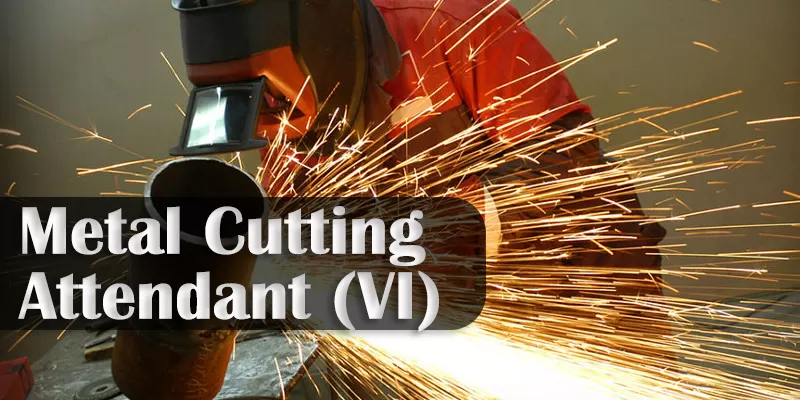
The ITI trade Metal Cutting Attendant (VI) is a vocational training program designed to provide candidates with essential skills in metal cutting, shaping, and finishing operations. This trade focuses on fundamental machining processes and the safe operation of cutting tools and machines used in the metal industry. The course is part of the Craftsman Training Scheme (CTS) and is administered by the Directorate General of Training (DGT) under the Ministry of Skill Development & Entrepreneurship (MSDE), Government of India.
This training program equips students with theoretical knowledge and hands-on skills necessary for employment in manufacturing industries, workshops, and fabrication units. It is specially designed for candidates with visual impairment (VI), ensuring accessible and inclusive skill development.
Course Duration
The Metal Cutting Attendant (VI) trade is a one-year course divided into two semesters, focusing on both theoretical and practical training.
Eligibility Criteria
- Candidates must have completed 8th standard from a recognized board.
- The course is designed to be accessible for visually impaired (VI) individuals, with specialized training methods.
- The minimum age limit is 14 years, with no upper age restriction.
Objective of the Course
The primary objective of this trade is to train visually impaired individuals in basic metal cutting and machining operations, enabling them to work efficiently in industries requiring metal processing. The course aims to:
- Develop skills in metal cutting, filing, grinding, and drilling.
- Familiarize trainees with workshop safety protocols and hand tool usage.
- Train candidates in measuring and marking techniques used in metal fabrication.
- Provide knowledge of machine operation including lathe, drill press, and grinding machines.
- Enhance employability skills for better job opportunities in metal industries.
Course Syllabus
The Metal Cutting Attendant (VI) course is divided into theoretical and practical components:
Professional Skills (Practical Training)
- Workshop Safety & Tool Handling
- Safety procedures, protective equipment usage, and emergency protocols.
- Identification and handling of different hand tools like files, hacksaws, and chisels.
- Measuring and Marking Techniques
- Usage of measuring tools like steel rules, vernier calipers, and micrometers.
- Marking techniques using scribers, punches, and surface gauges.
- Metal Cutting Techniques
- Basic metal cutting using hacksaws, chisels, and files.
- Hands-on practice in shearing, bending, and forming operations.
- Drilling and Grinding Operations
- Operation of bench drilling machines.
- Precision grinding using grinding wheels and belt grinders.
- Basic Machining Operations
- Simple machining tasks using lathes and milling machines.
- Working with different metals including mild steel, aluminum, and brass.
- Surface Finishing Operations
- Smoothing and polishing techniques using abrasive papers and buffing wheels.
- Coating and painting methods for corrosion protection.
Professional Knowledge (Theory)
- Introduction to Metal Cutting Industry
- Overview of the metal cutting and fabrication sector.
- Different types of metals and their properties.
- Workshop Science & Calculations
- Basic mathematics related to measuring, cutting speeds, and angles.
- Understanding of force, pressure, and material strength.
- Engineering Drawing and Blueprint Reading
- Basics of engineering drawings, symbols, and dimensions.
- Reading simple blueprints and understanding work instructions.
- Occupational Safety and Environmental Protection
- Safety regulations in metal workshops.
- Environmental concerns in metal processing and waste disposal.
- Employability Skills
- Communication and teamwork in industrial settings.
- Resume writing, interview preparation, and job search skills.
Job Roles and Career Opportunities
After completing the Metal Cutting Attendant (VI) trade, candidates can work in various roles in the manufacturing and metalworking industries:
Job Roles
- Metal Cutting Attendant – Works in workshops assisting machinists in metal cutting operations.
- Workshop Assistant – Supports technicians in industrial machine shops.
- Grinding Machine Operator – Operates and maintains grinding machines in metal fabrication.
- Drilling Machine Operator – Handles bench drills for precise hole-making tasks.
- Production Helper in Manufacturing Units – Assists in assembly and finishing operations.
Employment Sectors
- Metal Fabrication Workshops
- Automobile Manufacturing Units
- Machine Tool Industries
- Railway and Aerospace Workshops
- Public Sector Enterprises
Certification and Recognition
Upon successful completion of the training program, trainees receive the National Trade Certificate (NTC) from DGT, Government of India. This certification is recognized by industries across the country and helps in securing job placements.
Conclusion
The Metal Cutting Attendant (VI) trade provides an excellent opportunity for visually impaired individuals to gain industry-relevant skills and secure employment in the metalworking sector. The course emphasizes practical training, making it a valuable choice for candidates aspiring to work in metal fabrication, machining, and manufacturing industries. With strong demand for skilled metalworkers, graduates of this course can build a sustainable career in the industry.
